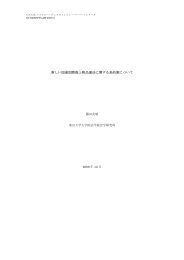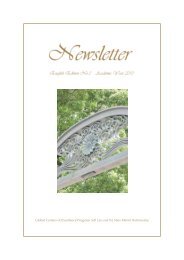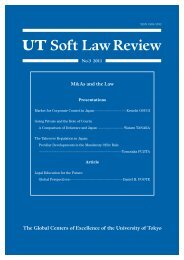UT Soft Law Review
UT Soft Law Review
UT Soft Law Review
You also want an ePaper? Increase the reach of your titles
YUMPU automatically turns print PDFs into web optimized ePapers that Google loves.
<strong>UT</strong> <strong>Soft</strong> <strong>Law</strong> <strong>Review</strong> No.2 2010bidder.In most plans (304 plans out of total 359), judgment for triggering is to be made by aspecial committee composed of independent individuals. In some companies’ plans, suchdefense measures are to be triggered after approval at the shareholders’ meeting.Because the Tokyo High Court decision on Nippon Broadcasting and the METI-MOJGuidelines emphasize shareholder decision, most public companies adopt defense schemeswhich ask for a decision at the shareholders’ meeting either when it introduces a pre-biddefense plan and/or when it triggers such plan. 13 In practice, in most companies, the boardproposal for introducing an advance warning type defense measure was put for approval atthe shareholders’ meeting, and in fact obtained shareholder approval. For those companieswho introduced advance warning defense plans, it is unknown whether they will survive ajudicial review when such plan triggers the pill, because to date, there has been no case inwhich that happened, except in the JEC case noted above. 14In May, 2007, Steel Partners, a U.S. buy-out fund, commenced a hostile tender offer for alloutstanding shares of Bulldog Sauce, a Worchester sauce producer. 15 Bulldog Sauce did nothave any pre-bid defense plan. As a post-bid defense, the board of Bulldog Sauce intended toissue stock warrants to all stockholders, including Steel Partners and its affiliates (collectively“SP”), with the condition that SP cannot exercise the warrants. The warrants have aredemption feature, by which the warrant holders other than SP receive common stocks inexchange for turning the warrants into the company whereas SP receives cash. Thus, thescheme was structured as a scheme diluting the voting right of SP without an economic lossto SP (“economic” does not include the value of voting right). The Bulldog board introducedthe proposal at the annual shareholders’ meeting on June 24, 2007, and the plan was approvedby more than 80% shares. SP sued to enjoin the issuance of the warrants. The Tokyo DistrictCourt held on June 28, 2007 that the scheme was valid.The court held that strict judicial scrutiny adopted by the High Court decision on NipponBroadcasting case does not apply here because the defense measure was approved at theshareholders’ meeting. The court also held that since the defense measure provides “justcompensation” to the hostile bidder, it does not violate the proportionality principle. In otherwords, the court’s position is that “necessity” is presumed because shareholders decided and“proportionality” is subject to judicial review (and it was held to be satisfied in this case).Steel Partners appealed, but the Tokyo High Court affirmed on July 9, 2007. Tokyo High13 Out of 359 advance warning plans, 307 plans were introduced by approval at the shareholders’ meeting.The remaining 42 plans were introduced by board decisions only. See supra note 12.14 See supra note 11.15 For a detailed description and analysis of this case and the court decisions, see Sadakazu Osaki, TheBull-Dog Sauce Takeover Defense, 10 Nomura Capital Market <strong>Review</strong>, No.3, at 2 (2007).6





